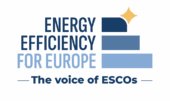we have sent our answers to the EU Commission’s consulattion on the RED revision proposal.
We believe that the revision of the Renewable Energy Directive (RED) should be an occasion to further foster the role of already available solutions for the decarbonisation of the heating & cooling (H&C) sector, and to focus more on the potential of energy efficiency measures, as it is an absolute prerequisite to fuel switch, and key to optimise any installation, whether it is using renewable energy sources or not.
In our feedback we emphasised that:
- Encouraging more ambitious RES targets also requires greater emphasis on energy efficiency
To deliver EU climate objectives, energy efficiency and renewable energy developments must go hand in hand, mutually reinforce, and be consistently supported, both at EU and national levels.
EFIEES welcomes the increased overall EU objective for renewable energy (RES). Tackling the untapped potential for energy and emissions savings within the industry sector is also a positive aspect of the proposal.
Yet, the “Energy Efficiency First” principle and energy efficiency measures should be better recognised and supported in the Renewable Energy Directive (RED). To that end, dynamic energy management solutions, such as Energy Performance Contracts, which are key tools targeting both energy and CO2 performance/savings, should be better promoted within the revised RED.
- The EU needs an ambitious and coherent path for decarbonisation of heating and cooling sector
EFIEES welcomes the increased focus on heating and cooling (H&C) decarbonisation. The role given to waste heat in reaching Member States’ targets will also help to effectively support decarbonisation.
Nevertheless, setting higher targets will require facilitated access to support to Member States, especially in countries still relying mainly on coal as a heating source.
To ensure an effective transition and a smart energy system integration, it is crucial to foster integrated energy planning at the local level (Art. 20a). The raised indicative target for the increase of RES share in DHC sector (2.1 ppt/year) will also reinforce the DHC contribution to the decarbonisation of EU economy.
